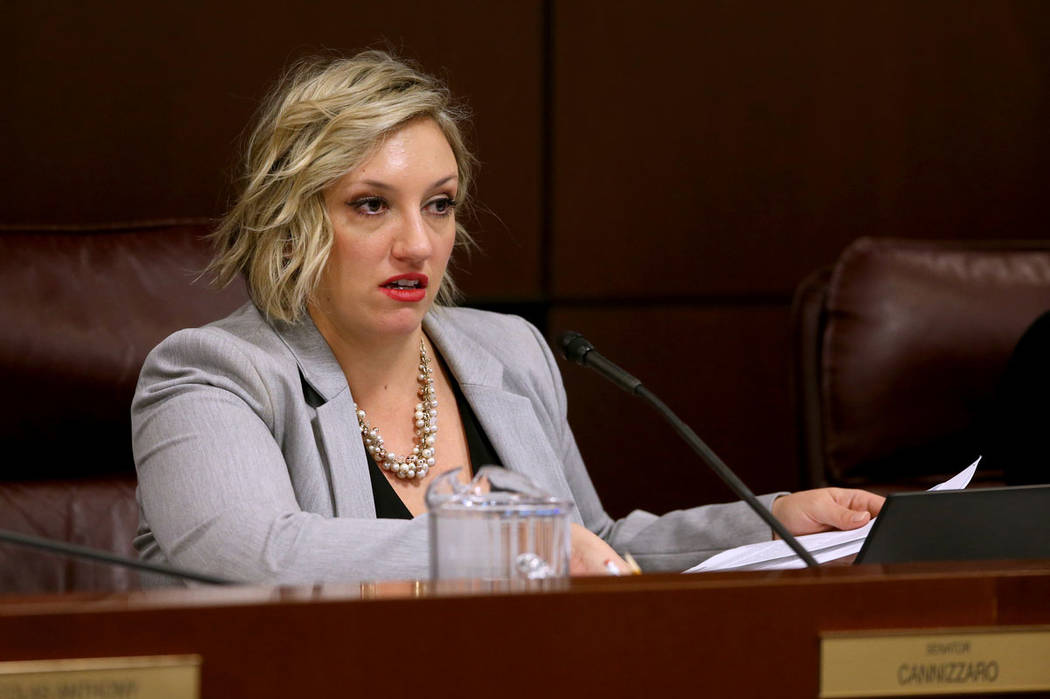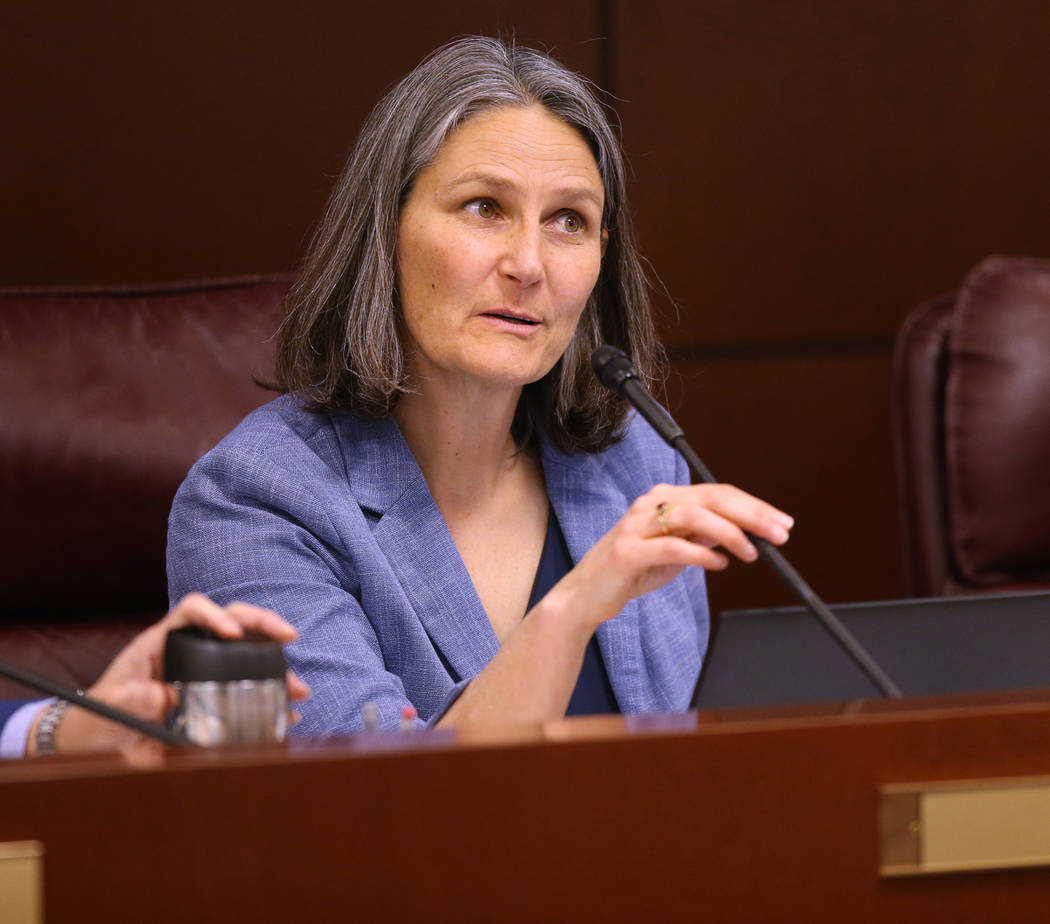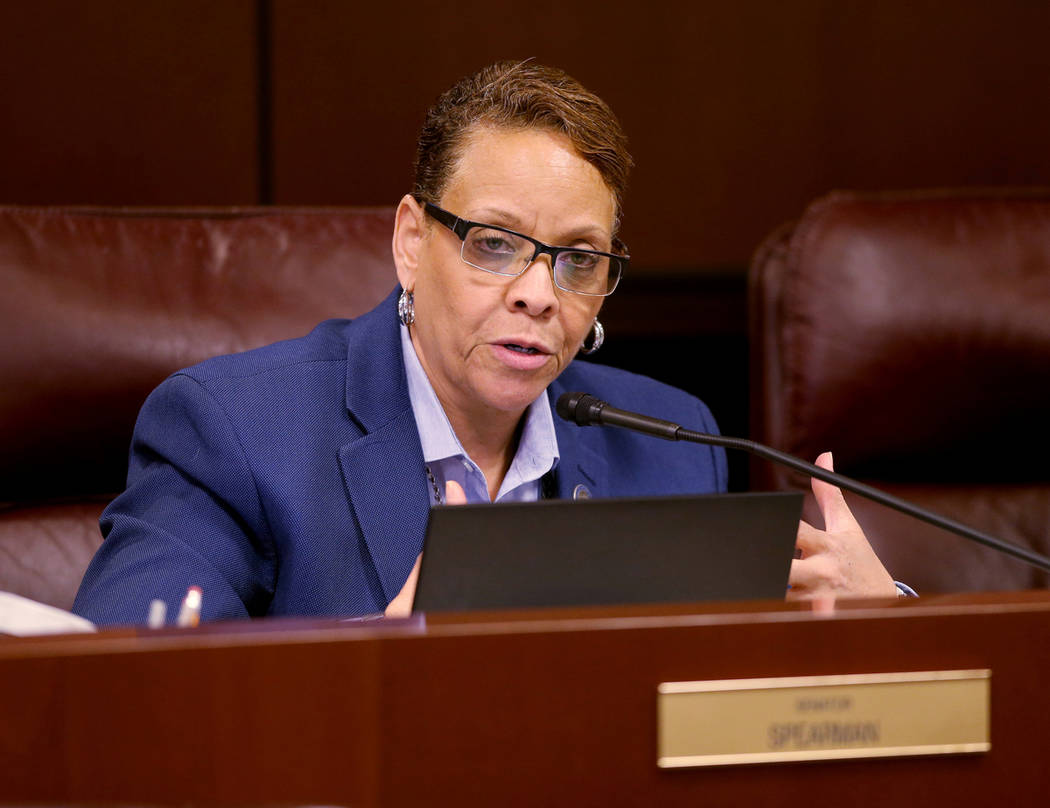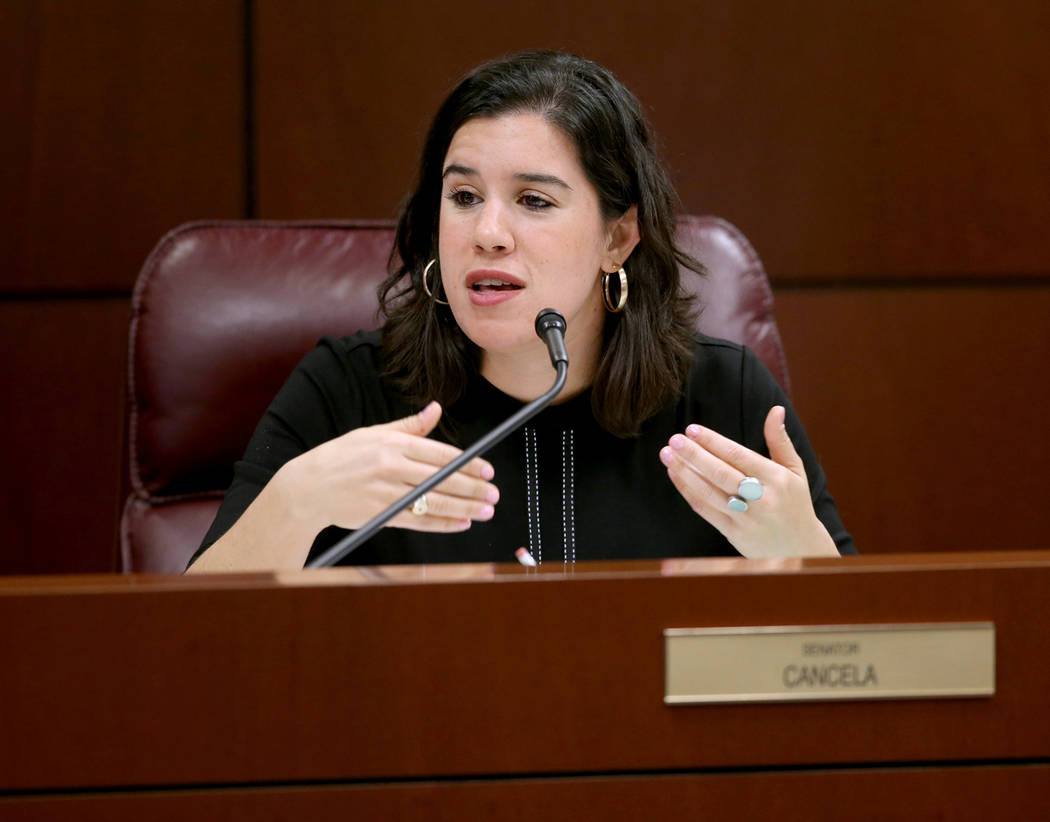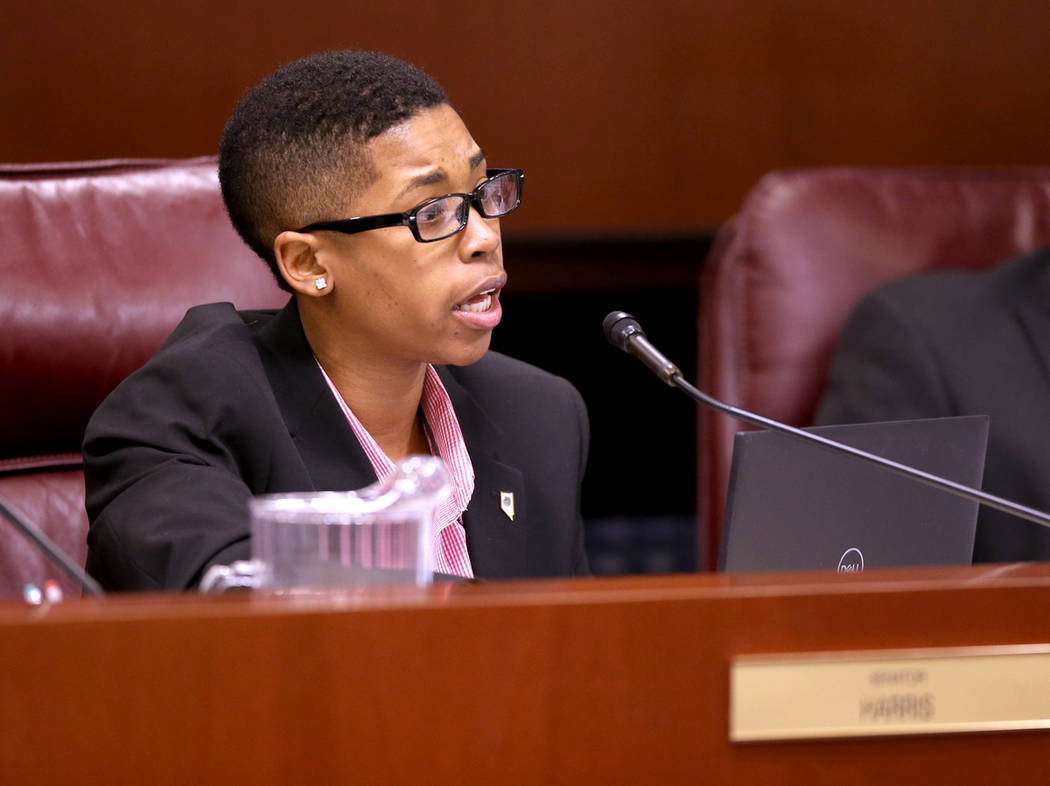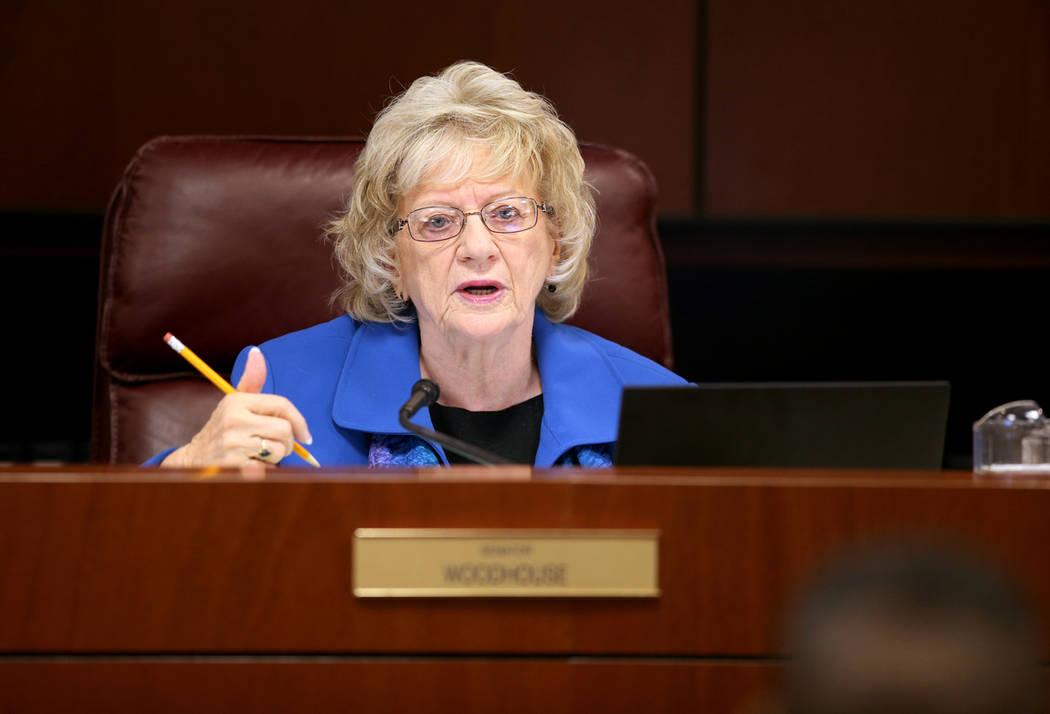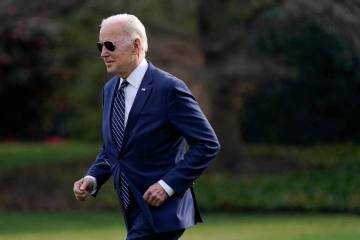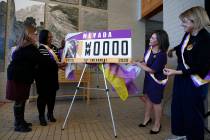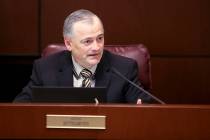Nevada’s first female majority Legislature got a lot done
CARSON CITY — It was a common sight during the 2019 legislative session: Sen. Julia Ratti of Sparks, leaving the suite of Democratic leadership offices as the clock wound toward midnight.
Kelvin Atkinson’s resignation as majority leader in early March, after he’d admitted to misusing campaign funds, had moved Ratti up to assistant majority leader, and Sen. Nicole Cannizzaro of Las Vegas was promoted to Atkinson’s position.
As Ratti left one night, she glanced at the wall of photographs of previous Senate leaders hanging outside the office, recently updated to reflect the leadership change. There was Cannizzaro’s picture at the front of a long, all-male line of previous Senate leaders.
And in that moment, the significance of the entire session, the first in the nation in which women sat in the legislative majority, came into relief for her.
“The circumstances under which Nicole became the majority leader — there wasn’t a whole lot of time for pomp and circumstance or celebration of this incredible milestone,” Ratti recalled in an interview last week. “Most of the time, we were too busy to be thinking about gender or how gender affected anything we were doing. We were just getting the job done.”
“So when you see that picture, and you see the long line of other photos,” she added, “it’s makes you pause.”
Observers are just starting to assess the various effects of the country’s first female-majority session, on legislating as well as legislation. They’ll compare Nevada with other states, where the dominate narrative in 2019 was retrenching on women’s issues such as abortion rights.
They’ll look to see whether women will keep the seats they won across the country in 2018, and whether Nevada’s 50-percent-plus-one female majority will be a bellwether for other states or just a statistical ripple.
While they do, it’s worth taking a look back at the historic 80th legislative session through the eyes of lawmakers who made it so.
“Yes, we made history, but we got a lot of things done,” said Sen. Pat Spearman, a North Las Vegas Democrat, retired soldier and ordained minister elected in 2012. “It will say to people, unequivocally, that not only can women lead, but women are leading.”
What got done
Issues of particular interest or relevance to women were significant elements of the Democratic legislative blueprint: economic opportunity, health care, education, housing, and criminal and social justice.
“I don’t think it’s any surprise that those are the kinds of topics that got attention, because when you have that many women serving in the Legislature, they know that those are kind of critical life or death, or at least economic prosperity issues for women,” Ratti said.
From the ceremonies on the first day to national media attention, overlooking the historical nature of the session was impossible. The spotlight kept the female-focused agenda consistently at the forefront of policy discussions and put “an emphasis on women in leadership and women in politics and what it means to have women in that position,” Sen. Yvanna Cancela said.
On the list of accomplishments: new laws that strengthen the state’s domestic violence penalties, create a sexual assault survivors bill of rights, add permanent funding for rape kit testing at the state level, remove the requirement for a doctor to ask a woman if she’s married before she can get an abortion and provide money for family-planning services.
“I think there is a direct correlation between a majority female Legislature and the policies we brought forward,” Cancela said.
Another example is Spearman’s gender pay equity bill that easily passed the session and was signed into law. The first time she pushed the bill, four years ago, it got a single committee hearing but no vote. On the day it died, Spearman said, several male colleagues told her they “just don’t see a need for it.”
The proposal passed the Legislature in 2017, but was met with a veto from then-Gov. Brian Sandoval. This year was different. It passed by lopsided majorities in both houses and was promptly signed by Gov. Steve Sisolak.
“When we got down to talking about things that matter to women, I’m not saying it wouldn’t have happened if men had been in charge,” Spearman said. “But having a female majority, once those conversations started there was less we had to explain.”
Worth 1,000 words
Cancela had a similar moment of reflection in front of that wall. She, Ratti and Cannizzaro started their first terms together in 2017 and roomed together in Carson City this session.
“Just the visual representation of seeing Sen. Cannizzaro’s face on the wall after a sea of men, I think that’s a historic moment and I personally feel very honored to be a part of it,” she said.
Cannizzaro, a Las Vegas prosecutor, said she’s “probably still getting a little used to it, to seeing my face up there, to be sure.
“I’ve tried to stay focused on ensuring the things we need to do. I think it’s humbling and it’s an honor.”
Aside from celebratory moments bookending the session, the subject of the female majority rarely came up on its own. Having women break through the 50 percent threshold held big symbolic significance, but Ratti said the difference was slight.
“You don’t see a huge difference in governance between having 40 percent plus of the membership and 50 percent plus one, right?” she said. “In terms of the day-in and day-out governance, the kind of issues that we tackle, it wasn’t that significantly different from last session, because we had a pretty strong presence of women last session as well.”
But there was a lot of diversity even among the women, she said.
“When you talk about race or ethnicity or gender identity or sexual preference — across the spectrum, it is very diverse. What kind of jobs we held, what kind of backgrounds we come from,” Ratti said. “And that richness, that’s what I think really added to the quality and variety of legislation that came out of the session.”
A newcomer’s perspective
“When I put in my application to be appointed I really had no idea that we were so close to making history as the first female majority legislature,” said Dallas Harris, a Las Vegas lawyer for the Public Utilities Commission who was appointed to fill Aaron Ford’s Senate seat after Ford was elected attorney general. That majority happened officially when two women, Bea Duran and Rochelle Nguyen, were appointed to vacancies in mid-December.
“I was excited, and energized. I had no idea that I was actually going to have an opportunity to be part of something so big,” she said. “It’s not just this particular majority-female legislature. I think it’s a lot about who we are as well that made a very, very big difference. It’s not just women. It’s the group of women that we had.”
As for comparisons, “I don’t have a non-female-majority legislature to compare it to and to see how collegial it may have been, or what kind of bills were easier to pass or not,” she said. “I’d like to see us maintain this level of minimum representation. And we will simply wait for other states to catch up.”
She recalled Supreme Court Justice Ruth Bader Ginsburg’s response once to being asked what she thought was the appropriate number of women justices on the court. She said nine.
“And people kind of laughed or whatever, but her retort was, ‘But we’ve had nine men forever. What’s so funny about the idea of having nine women?’”
A veteran lawmaker looks back
Back in the mid-1970s, when women in Nevada and elsewhere in the U.S. held only 5 to 10 percent of legislative seats, Joyce Woodhouse was a school teacher lobbying on behalf of K-12 education, and the message she heard in Carson City was: Women don’t belong here.
“I, in fact, was told by a legislator when I was a lobbyist that you need to go home, get married and have babies,” Woodhouse recalled. “That doesn’t go over too well, and it didn’t go over with me then, either.”
First elected to the Senate in 2006, she returned after a break in 2012. In 2019, her final session because of term limits, she led the critical Senate Finance Committee and passed a rewrite of the state’s half-century-old school funding plan along with colleague Mo Denis.
“It’s been gradual, you know, from 2007, my first session, to 2019, my last session, in how changes have come about, how women are in positions of chairing major committees like finance, and ways and means and commerce and labor, and judiciary,” she said.
“I’m not sure we all said it is a female-majority legislature for the first time in history in the U.S., so we can do these things. It was more of, ‘We’re here; let’s see what we can accomplish that’s good for our families, and our communities in the state.’”
“I think women are known for being really good at multitasking and sitting down at the table and working with everyone, whoever they are. So I think that’s just what we do,” she said.
Republicans lag
Democrats elect more women to legislatures than do Republicans. The numbers nationally are roughly 2-to-1 in favor of Democrats. Sen. Heidi Gansert, R-Reno, is the only Republican woman in the eight-member GOP Senate minority. This session, though, she was less isolated from her male colleagues.
In 2017, “I was the lone Republican on the Senate side who voted for the Equal Rights Amendment; I was the lone Republican who voted for 12 months of contraception for women,” Gansert said. “And this time, I had four colleagues and myself. So five Republicans voted to support equal rights and five colleagues voted on the contraceptive.”
Looking back at the session, “I recognized that there was significant legislation around women’s issues, whether it was sexual assault, sex trafficking, pay equity, domestic violence — all those things, you know, as simple as extending a temporary protection order from 30 to 45 days or coming up with the sexual assault survivors bill of rights. …”
Republican Assemblywoman Melissa Hardy, of Henderson, cited those same issues.
“Those are things women have historically fought for. Especially now, with the Me Too movement,” she said. “I think those are things that the nation and the state were thinking about and focusing on. I think that definitely had an effect on what we did in our Legislature.”
Democrats, Gansert said, have been more successful at getting women elected, although Republicans “had quite a few women on the ballot.”
Overall, Gansert said, having more women in the majority “lent to an environment where we had more collegiality and collaboration, and while we didn’t agree, colleagues treated each other very respectfully. The partisanship was significantly reduced in this environment. So we disagreed on the issues, but everybody treated each other extremely well.”
The numbers over time
The rising number of women serving in Nevada’s Legislature has largely mirrored the national trend. In 1971 women held just 4.5 percent of legislative seats nationwide. In 1992, dubbed the “Year of the Woman,” they surpassed the 20 percent mark for the first time. It would take another 25 years for women to top the 25 percent mark, said Katie Ziegler, program manager of the Women’s Legislative Network at the National Conference of State Legislatures.
The 2018 elections saw the largest one-year jump ever for representation by women, from just more than 25 percent to nearly 29 percent. Women nationally now hold 2,131 of 7,383 legislative seats, according to the Center for American Women and Politics at Rutgers University’s Eagleton Institute of Politics.
The top four states — Nevada, Colorado, Washington and Oregon — and six of the top 10 are in the West. At the other end, four of the five states with the lowest female representation, and seven of the bottom 10, are in the South. Mississippi, West Virginia and Tennessee are followed by one Western state, Wyoming, at fourth-lowest, with Alabama at fifth.
Factors that contribute to Nevada and Colorado’s leadership are legislative term limits, Ziegler said, though not all of the 15 states that have them show similar gains for women. Groups that supported women running for office, particularly Democrats, such as Emerge America also were active in the two states. In the 2018 legislative races, the group’s Nevada chapter formally backed 19 candidates for office; 11 won.
Women in Nevada surpassed the 50 percent representation level via three post-election appointments, but that is testament to the number of qualified candidates, Ziegler said. Running for office is one thing. That there “were also women ready and lined up for those opportunities I think is really important.”
And from Ziegler’s perspective, the presence of more women changed how legislative business was conducted.
“Women in Nevada really made it a priority to get to know each other, recognizing that there may be one bill where you’re in disagreement, but then tomorrow’s another day and there’s something else that’s gonna come along and the perspective may be different,” she said.
Taking stock, and what comes next
With more than 600 bills passed and signed into law this year, it’s difficult to quantify the exact impact the nation’s first female majority on legislation compared with past sessions, said Sondra Cosgrove, president of the League of Women Voters of Nevada and a history professor at the College of Southern Nevada.
“We can have scientific metrics to say this changed, that didn’t,” Cosgrove said. “It’s going to take that level of dissection before we know for sure.”
The differences and impacts can be subtle: Greater diversity in the Legislature could also invite more participation from other groups traditionally under-represented in policy discussion and debate.
“When you’ve got a single mom and she’s working swing shifts and her kid’s having problems, when you’re looking at another mom, that’s important. You’re more likely to show up and testify,” Cosgrove said. “You want to see somebody like you staring back at you.”
Virginia elections in 2017 put women over the 25 percent mark in legislative seats held, and the midterms in 2018 pushed the number toward 30 percent. Ziegler and others are keen to see whether Virginia’s female lawmakers hold their seats in 2019, and more dramatically, what happens in the 2020 presidential year races.
What higher female representation means for legislating in general, in Nevada and in other states as they perhaps catch up, is “something we’re still kind of grappling with here,” Ziegler said.
A group of researchers at UNLV is embarking on such a study, looking at how lawmakers collaborated across party and gender lines and the impact the female majority had on legislation, said UNLV political science professor Rebecca Gill, who is helping to direct the study.
“We can already see that there were quite a few pieces of legislation that are typically called women’s issues that received a lot of attention,” she said.
What term limits also foster is a focus on mentorship, Ziegler said. In the case of Colorado, female lawmakers “have really been deliberate about recruiting women to come after them given that they know there’s a hard end date for their tenure.” Nevada’s efforts appear equally strong.
Ratti took the seat held by Sen. Debbie Smith, a mentor to many women in the Legislature and beyond, who died in 2016. Her portrait also hangs outside the Senate leadership office.
“And I will sort of say goodnight to Debbie on my way out because she’s always right there. And I try very hard to honor the legacy that she left,” Ratti said. “So I sort of have this regular check-in with Debbie when I leave. And so I do that and then I pivot and there is Nicole.”
“We do stand on the shoulders of every one of those women that came before us and, you know, put out their hand and said, ‘You can do this, too.’”
Contact Colton Lochhead at clochhead@reviewjournal.com or 775-461-3820. Follow @ColtonLochhead on Twitter. Contact Bill Dentzer at bdentzer@reviewjournal.com or 775-461-0661. Follow @DentzerNews on Twitter.
Timeline
1918: Sadie Hurst, a Republican from Washoe County, becomes the first woman in Nevada elected to the Legislature when she is elected to the Assembly.
1921: Ruth Averil, a Republican from Nye County, becomes the first woman to chair a legislative committee, overseeing both the Engrossment and State Liberty Assembly committees.
1923: The Assembly Committee on State Liberty becomes the first committee in state history to be made up of mostly women.
1935: Lyon County Democrat Frances Friedhoff becomes the first woman to serve in the state Senate.
1966: Helen Herr, a Clark County Democrat, becomes the first woman elected to the upper chamber.
1994: Bernice Mathews, a Democrat from Washoe County, becomes the first African American female legislator elected to the Senate. She was inducted into the Senate Hall of Fame in 2013.
1995: Sandra Tiffany, a Republican from Clark County, is named speaker pro tempore of the Assembly, becoming the first woman in state history to hold a leadership role in the Legislature.
2001: Senate Minority Leader Dina Titus, Assistant Minority Leader Bernice Matthews and Minority Whip Valerie Wiener become the first all-female leadership team in state history.
2004: Francis O. Allen, a Republican from Clark County, becomes the first Asian American female legislator elected.
2007: Barbara Buckley is elected as first female Assembly speaker. (Elected again in 2009).
2010: Teresa Benitez-Thompson, Irene Bustamante Adams, Olivia Diaz and Lucy Flores become the first Hispanic female legislators elected.
2018: Nevada achieves first overall female majority in U.S. history. With the appointments of Assemblywomen Rochelle Nguyen and Bea Duran, 32 of the state's 63 legislative seats were held by women in the 2019 session.
2018: Shea Backus, a Clark County Democrat, becomes the first Native American female legislator elected.
2019: Nicole Cannizzaro, a Clark County Democrat, becomes the first female Senate majority leader in March after then-leader Kelvin Atkinson resigns and pleads guilty to misusing roughly $250,000 in campaign funds.



